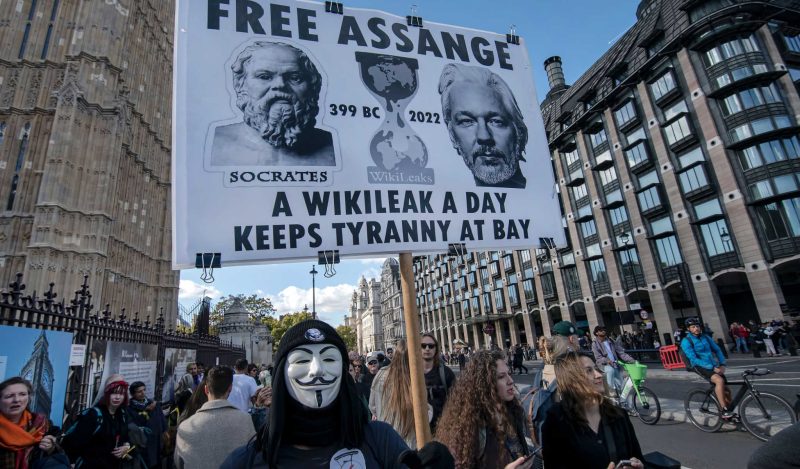While obituaries this week will rightfully laud Daniel Ellsberg for his disclosure of the lies and deceptions behind the Vietnam War, two ideological descendants of the Pentagon Papers, Julian Assange and Edward Snowden, remain unfree.
This weekend marks 11 years since Julian Assange entered the Ecuadorian Embassy in London and began his confinement as a political prisoner. The torture that he has endured is not just an attack on his rights of free expression and journalism; it is an assault on your right to be an informed citizen.
His persecution was a harbinger for the merger of state and corporate interests, the increased suppression of dissent, and the dual system of law that indemnifies the powerful and punishes dissidents.
War hawks have weaponized the financial system against their political opponents. The Justice Department and Intelligence Agencies look to kill a man for exposing their crimes. And an obsequious press corps dithers as the most influential journalist of the century rots behind bars.
Behind the tragedy and persecution of Assange as an individual is a broader societal narrative. The most powerful groups in the country don’t believe that you have a right to know their crimes or protest their policies.
Forget any preconceptions you may have about Mr. Assange’s character. The bogus “rape” charges and media smear campaigns are distractions from the meaning of his work. Authorities have persecuted Assange because he published information that they wished to keep secret. He committed the crime of journalism in an era of corporate press releases.
Consider the importance of just one story that Assange broke thirteen years ago:
In 2010, Wikileaks released “Collateral Murder,” a 38-minute video of American soldiers killing a dozen Iraqi civilians and two Reuters journalists. The recording remains available online, showing two Apache helicopter pilots unleashing fire on the men below as if it were a videogame.
“Look at those dead bastards,” one killer says. “Nice,” his co-pilot responds.
There was no strategic basis for denying American citizens the right to view the video; the coverup was a public relations maneuver designed to evade blowback from the apparent war crimes.
The response was a scandal in itself. No American soldiers or commanders were held accountable for the killing. Instead, the publisher is dying in a prison cell. For four years, Assange has been held at Belmarsh Prison, “Britain’s Guantanamo Bay,” where he awaits the United States’ motion for extradition.
After Collateral Murder, Senator Joe Liberman successfully pressured Amazon to remove Wikileaks from its server and convinced companies including Visa, MasterCard, and PayPal to deny financial services to the platform. Later, the CIA plotted to assassinate him in the Ecuadorian Embassy.
Assange and Wikileaks continued to serve as the most influential publishers in recent history. They uncovered 500,000 documents from the wars in Afghanistan and Iraq that showed the truth about civilian deaths in the United States’ military campaigns. They published the US Army manual for Guantanamo Bay, which outlined isolation tactics for prisoners. They revealed US State Department Cables detailing a secret campaign of drone strikes in Yemen. They released emails from the Democratic National Committee that showed a coordinated effort to favor Hillary Clinton over Senator Bernie Sanders in the primary elections.
Now, Assange faces 175 years in prison for charges under the Espionage Act, a 1917 law used to jail President Woodrow Wilson’s political opponents and critics of US involvement in World War I. Presidential candidate Eugene Debs was sentenced to ten years in federal prison in 1918 for telling a crowd of followers, “You need to know that you are fit for something better than slavery and cannon fodder.”
A century later, Assange faces death in an American prison for exposing the cannon fodder of the War on Terror.
“Assange is not persecuted for his own crimes, but for the crimes of the powerful,” writes Nils Melzer, UN Special Rapporteur on Torture and author of The Trial of Julian Assange. “The persecution of Assange establishes a precedent that will not only allow the powerful to keep their crimes secret but will even make the revelation of such crimes punishable by law. Let us not fool ourselves: once telling the truth has become a crime, we will all be living in tyranny.”
Once Covid emerged, the established precedent was used against the citizenry at large, and the tyranny was suddenly obvious.
PayPal and GoFundMe used Senator Liberman’s strategy to punish critics of the Covid regime like the Canadian truckers’ convoy. Corporate media dithered as the Biden administration actively censored critical journalists. The mass surveillance that Edward Snowden revealed was used to usurp Americans’ Fourth Amendment rights under the pretext of public health. And our legal system became increasingly warped to insulate the powerful and deny justice to the masses.
The meaning of Julian Assange is simple: should the powerful be able to indemnify themselves from legal and reputation recourse, or do citizens have a right to hold their officials accountable? His case represents more than his right to publish information – it is a question of whether we have a right to the information necessary to expose the crimes and corruption of our leaders.
Assange did not use his knowledge of government secrets to profit or influence peddle; that could have landed him a partnership at Kissinger Associates or a board seat at Lockheed Martin. Instead, the Biden administration looks to jail him for life because he exposed international crimes and corruption to the public for free.
Now we can observe the long trajectory of history. It did not begin three years ago. The groundwork for the censorial technocracy we face today was laid with a series of targeted hits that created enemies of the state. They did great things for the public well-being but were brutally punished for it. To this day, these people languish in an imprisoned state, martyrs for the freedom we once took for granted and the rights we hope to regain.
Join the conversation:


Published under a Creative Commons Attribution 4.0 International License
For reprints, please set the canonical link back to the original Brownstone Institute Article and Author.









